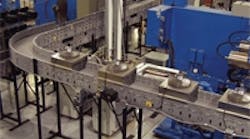By Lisa Zocco
After surviving an oil crisis, a global economic downturn and heated congressional debate over the future of General Motors and Chrysler, automotive suppliers have witnessed a decade’s worth of drama in the span of six months. Change is simply the way of life when it comes to building cars.
No wonder automotive suppliers are under relentless pressure these days to take a more active approach in refining their processes to adapt to changing market conditions. In this regard, sustainability isn’t just about being green. It also reflects a company-wide attitude about continuous improvement and flexibility.
Equipment that supports this corporate attitude tends to be adaptable based on varying needs. For example, modular conveyor systems are assembled in a “Lego” scheme of interlocking sectional units, including belts, sides, legs, motors and accessories. Working together as a system, the modules enable users to adapt quickly from one job to the next, complementing the kaizen philosophy of continuous improvement.
“Modular conveyors give us unlimited opportunities and keep us from having obsolete equipment with fixed-length conveyors,” says J.C. Noll, senior production engineer at North American Lighting Inc.’s (NAL) Flora, Ill., plant. “Fixed conveyors just back you into a corner. If you want to improve a process or work on some kaizen activity, you are somewhat strapped to the fixed-length conveyor’slength unless you want to go through the pain of cutting it down and then getting a new belt configured for that.”
NAL has been manufacturing lighting products for vehicle manufacturers such as Toyota, GM, Honda, Nissan and Subaru. The Flora plant produces headlamps, fog lamps and auxiliary combination systems.
NAL’s manufacturing process is based on the koito production system, which ensures that costs are closely controlled. Inventories are held to a minimum, engineering changes are implemented quickly and deliveries are on time.
Noll says that NAL put a premium on process improvement, emphasizing the Big Four: cost, delivery, timing and quality.
According to Noll, modular conveyor systems offer a sustainable, eco-friendly equipment solution that provides lower total cost of ownership savings in energy, reduced maintenance costs, shipping, installation and especially reconfiguration.
“If we purchased five new conveyors, which were all fixed length, and a year and a half from now, we wanted to make some other improvement, those conveyors might not have an application at that point, and they would become obsolete or idle equipment and then force additional expenditure,” says Noll. “With the DynaCon modular conveyor, if we want to make a change to the layout, we buy three additional modules and expand the conveyors three feet because now we can make it work.”
The modular conveyor system, manufactured by Muskegon, Mich.-based Dynamic Conveyor, is easily reconfigured by removing, inserting or exchanging modules available in lengths as short as six inches.
The Flora NAL plant uses the modular conveyor system to move product from one of 28 hydraulic and electric thermoplastic molding machines. The product is robotically placed on the conveyor, sent to an operator for inspection and then packaged or conveyed to another area for a secondary application.
Like many other suppliers in the automotive industry, NAL manufactures products with varying spans of production, ranging from 18 to 60 months.
“The flexibility of being able to change work-cell layouts is the bonus,” says Noll. “With the modular system, you can add or subtract modules to reconfigure based on kaizen activity when making productivity improvements or streamlining operator utilization.”
At NAL, kaizen is a daily activity. “We can move quickly to adapt a new idea,” says Noll. “It goes back to fixed-length conveyors. Trying to come up with the storage space to store a 24-foot conveyor that is no longer applicable becomes a problem. Floor space is a premium in our business, and external storage has a cost.”
Not only does it cost to store it, but the life of that piece of equipment is reduced as well when it is stored outside in a shelter.
The use of modular conveyor systems also eliminates the need for transition points. If a curved application is necessary, a curved module is one piece from start to end, whereas a fixed-length conveyor may have three pieces with a transition point.
“Based on the cosmetic requirements of our product, a fixed conveyor might increase our defect ratio,” says Noll. “So, the capability of doing a curve within the same conveyor adds a lot of flexibility for us.”
The use of modular conveyors with a selection of components and accessories enables manufacturers to adapt to a variety of challenging situations, such as running the conveyor around obstacles, transporting parts underwater, walk-under configurations, suspending the conveyor from ceilings and even continuing production flow to or from fixed metal systems.
Another advantage of the modularity of the system, according to Noll, is the ability to share equipment between the facilities. The Flora facility, for instance, was the first to employ the DynaCon system, but over the past six years, NAL’s other facilities have implemented the modular conveyor system.
“We have a sister forward-lighting plant in Paris and rear lighting in Salem as well as our new plant in Alabama,” says Noll. “We can share that equipment between the plants, and it makes it much better for us. If I needed a module, I can just call my fellow engineers in the other facilities and find out if they have any inventory.”
Finally, the modular conveyors are run by energyefficient, 1/30-hp to 1-hp motors. Specifying the right motor for each application and exchanging it when torque requirements change keeps kilowatt usage low, which ultimately reduces carbon emissions during the making of electricity.
Like nearly every company these days, NAL is striving for process improvement in a heightened period of economic uncertainty. Flexibility is one major step. Sometimes, sustainability isn’t just
about being green. It’s also the way you look at the world.
Lisa Zocco is a technical writer based in Long Beach, Calif. She specializes in industrial manufacturing and business-to-business communications.



